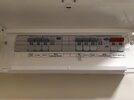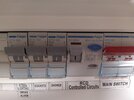Hi all,
I have quite a bit of electrical kit at home that I would be gutted to lose in the event of a mains surge - a high end gaming PC, a server and some old games consoles from my childhood that I would be devastated to lose.
I have a couple of plug in surge protectors like this but I have been wondering lately if an SPD in the consumer unit would be a valuable addition to our installation.
Wouldn't have to panic then when I forget to use the plug in surge suppressors.
Seems like a good idea, but are they reliable and do they offer the same level of protection as one of those plug in ones?
Finally, is the installation of these devices appropriate to be undertaken by a competent DIYer or should I get an electrician out?
For reference, here is the Hager branded CU from 2016 when the house was built:


I assume this would be the correct part for my CU?
Thank you all in advance for the advice. Also keen to hear the opinions of those on here who are sparks by trade.
I have quite a bit of electrical kit at home that I would be gutted to lose in the event of a mains surge - a high end gaming PC, a server and some old games consoles from my childhood that I would be devastated to lose.
I have a couple of plug in surge protectors like this but I have been wondering lately if an SPD in the consumer unit would be a valuable addition to our installation.
Wouldn't have to panic then when I forget to use the plug in surge suppressors.
Seems like a good idea, but are they reliable and do they offer the same level of protection as one of those plug in ones?
Finally, is the installation of these devices appropriate to be undertaken by a competent DIYer or should I get an electrician out?
For reference, here is the Hager branded CU from 2016 when the house was built:


I assume this would be the correct part for my CU?
Thank you all in advance for the advice. Also keen to hear the opinions of those on here who are sparks by trade.

